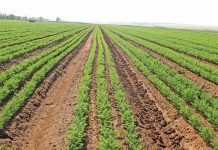At the last count, registered water use in SA stood at 17,2 billion m3, of which agricultural water use made up approximately 70%. While increases in the water price might not significantly impact the relatively small domestic water use sector based on total registered water use, the agricultural sector would feel the pinch of water price increases due to the large volumes that it uses.
”If left to spread uncontrolled, these freshwater weeds eventually cover water surfaces and shade out the natural ecological processes that take place under the water surface. These processes are important in maintaining good quality freshwater,” Marais said. “Uncontrolled water weeds also deplete the water of valuable nutrients and gases, as well as clogging pumps and irrigation equipment. Therefore, they must be managed within acceptable levels, but this comes at a cost.”
According to Dr Marais, there are about 145 000ha of river surface area and 266 000ha of dam surface area in SA. The current costs to manage the spread of freshwater weeds to under 5% of these surface areas nationwide costs WfW about R12 million per year. He added that if these weeds were allowed to spread to 30% of the surface areas it would cost an estimated R90 million per year to bring them down to below 5%; at a 50% spread these costs would increase to R200 million per year; and, 100% invaded freshwater systems would need R470 million per year to be controlled again.
“I very much doubt if the water bodies of the country would become fully invaded within a year, but I guess that if these weeds were left uncontrolled, all susceptible areas could well become fully invaded within 10 years. This scenario, however, is unlikely to happen. On the other hand, I am of the opinion that these freshwater resources could easily become up to 30% invaded within two years if left uncontrolled,” Dr Marais told Farmer’s Weekly.
As water weeds are listed as a water management activity in the National Water Pricing Strategy, their impacts would have implications for water users. Dr Marais said that, based on the registered water use figure of 17,2 billion m3, to maintain water weed levels to below 5% would cost water users an average of 0,1c/registered m3. To restore these levels back to below 5% from 30% would cost water uses 0,5c/registered m3, and if left totally unchecked the cost of controlling a 100% invasion of freshwater weeds would cost 2,7c/registered m3.
Based on these figures, an irrigated 100ha farm using 5 000m3/ha of water would cost a farmer R500 per year if water weeds were under the 5% level; R2 500 per year for 30% levels; and, R13 500 per year for a 100% invasion.
WfW said that it was managing the spread of water weeds through biocontrol, chemical control and manual control methods. It urged the public to become sensitised to the threats that water weeds pose to the quality and availability of SA’s freshwater resources, and to participate in local water weed management programmes. – Lloyd Phillips








